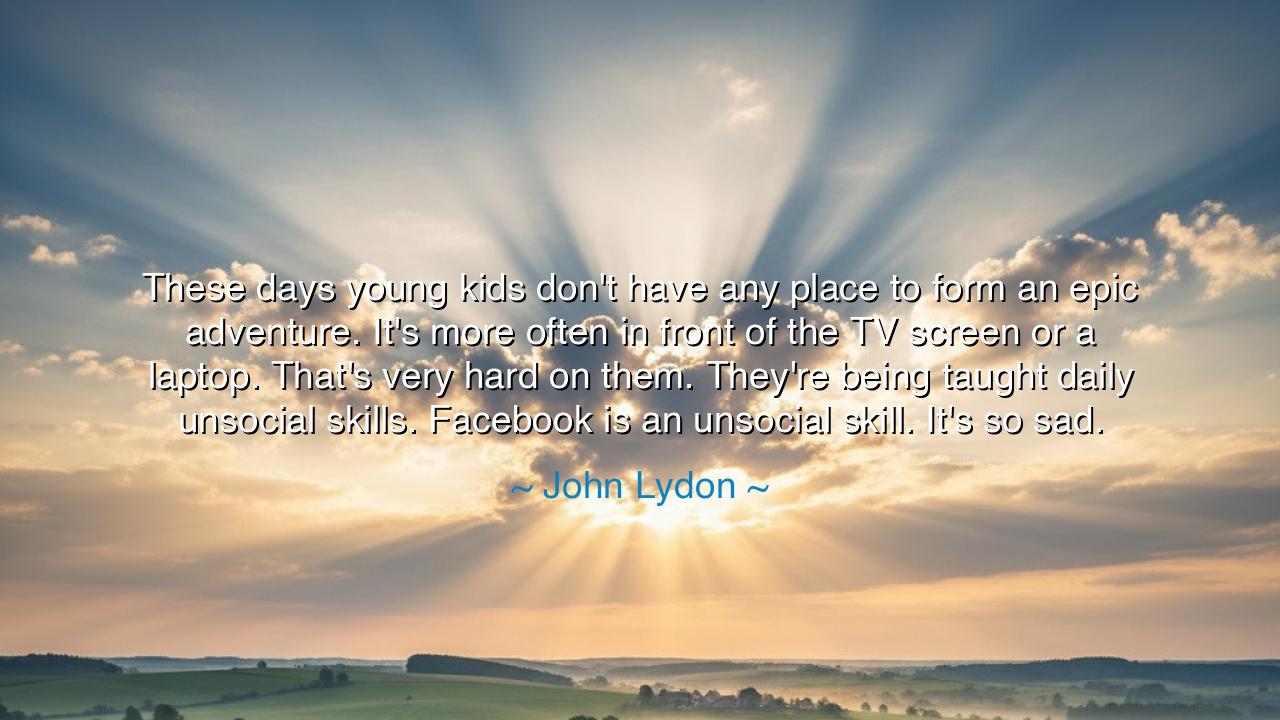
These days young kids don't have any place to form an epic
These days young kids don't have any place to form an epic adventure. It's more often in front of the TV screen or a laptop. That's very hard on them. They're being taught daily unsocial skills. Facebook is an unsocial skill. It's so sad.






Hear, O children of tomorrow, the lament of John Lydon, who spoke as one who has seen the world shift from fields of freedom to the prisons of glowing screens. He declared: “These days young kids don’t have any place to form an epic adventure. It’s more often in front of the TV screen or a laptop. That’s very hard on them. They’re being taught daily unsocial skills. Facebook is an unsocial skill. It’s so sad.” Though spoken with urgency, these words are not only a complaint—they are a prophecy, warning of what is lost when the spirit of youth is confined.
First, behold the phrase: epic adventure. In ages past, this was the birthright of every child: to wander the woods, to climb the hills, to imagine kingdoms where none existed, to test their courage against the raw elements of the world. In adventure, the young discover strength, friendship, and resilience. Without such trials, the soul grows pale, untested and untried. Lydon’s grief is for a generation that may never know the fire of self-discovery lit by wandering beyond comfort.
Next, he speaks of the TV screen and the laptop, the modern hearths where children sit not to forge but to consume. To watch and to click are not the same as to strive and to endure. Where once children learned by falling from trees, by losing their way and finding it again, they now learn from pixels that demand nothing of their bodies and little of their souls. Thus the muscles of courage, curiosity, and empathy wither when not used.
Then he strikes at the heart of the matter: unsocial skills. What is meant? That while the tools of technology promise connection, they often breed isolation. To look into another’s eyes, to hear the rhythm of their voice, to learn patience in silence—these are skills that form the bonds of community. But to scroll, to “like,” to vanish behind a screen is to practice habits that erode these bonds. And so, though we name them “social networks,” they may teach only separation, each soul locked in its own glowing chamber.
Consider the ancient story of Telemachus, the son of Odysseus. Left without a father, he might have remained idle, waiting for fate to deliver answers. But instead, he embarked upon a journey, crossing seas, speaking to kings, learning wisdom through hardship. His “epic adventure” was the forge of his maturity. Compare this with the plight Lydon describes: children who remain in their rooms, voyaging only through screens, never facing the trials that build character. Without adventure, how shall they learn who they truly are?
Yet let us not despair. For even in this age, the choice remains. Parents, elders, and mentors may yet guide the young to seek the world beyond the screen. They may encourage wandering walks, the forming of bands of friends, the daring to explore the unknown. Technology may have its place, but it must never replace the sacred rites of trial, error, and discovery that are the foundation of growth.
And so the lesson is this: do not let your life shrink to the size of a screen. Seek out your own epic adventure, even if it is as small as tending a garden, walking a new path, or learning a craft with your hands. Teach the young not only to use devices but to face life. Set down the phone, look into the eyes of those around you, and speak with the fullness of your voice. For only by living deeply in the real world will we ensure that the next generation inherits not a wasteland of loneliness, but a landscape alive with courage, friendship, and hope.






AAdministratorAdministrator
Welcome, honored guests. Please leave a comment, we will respond soon